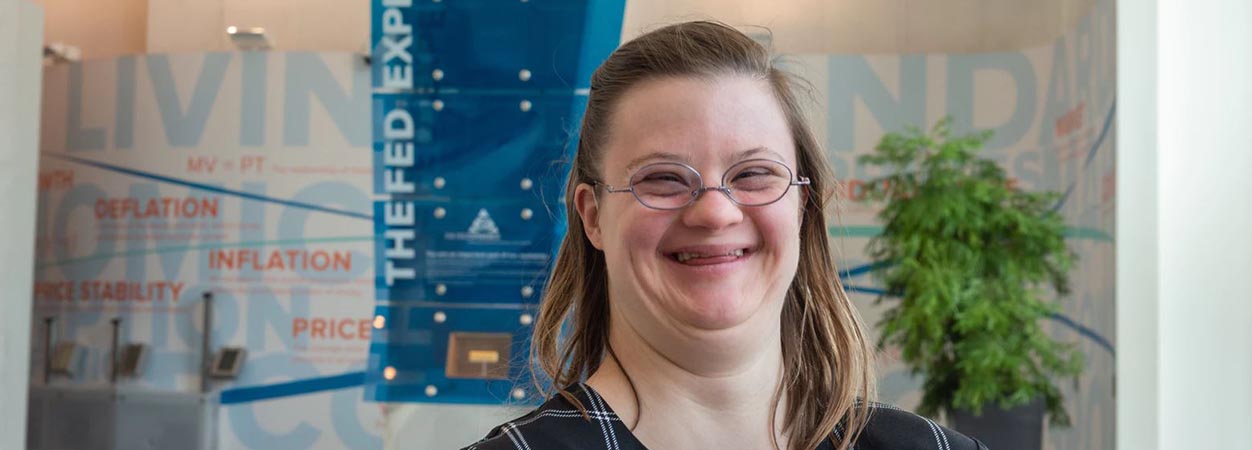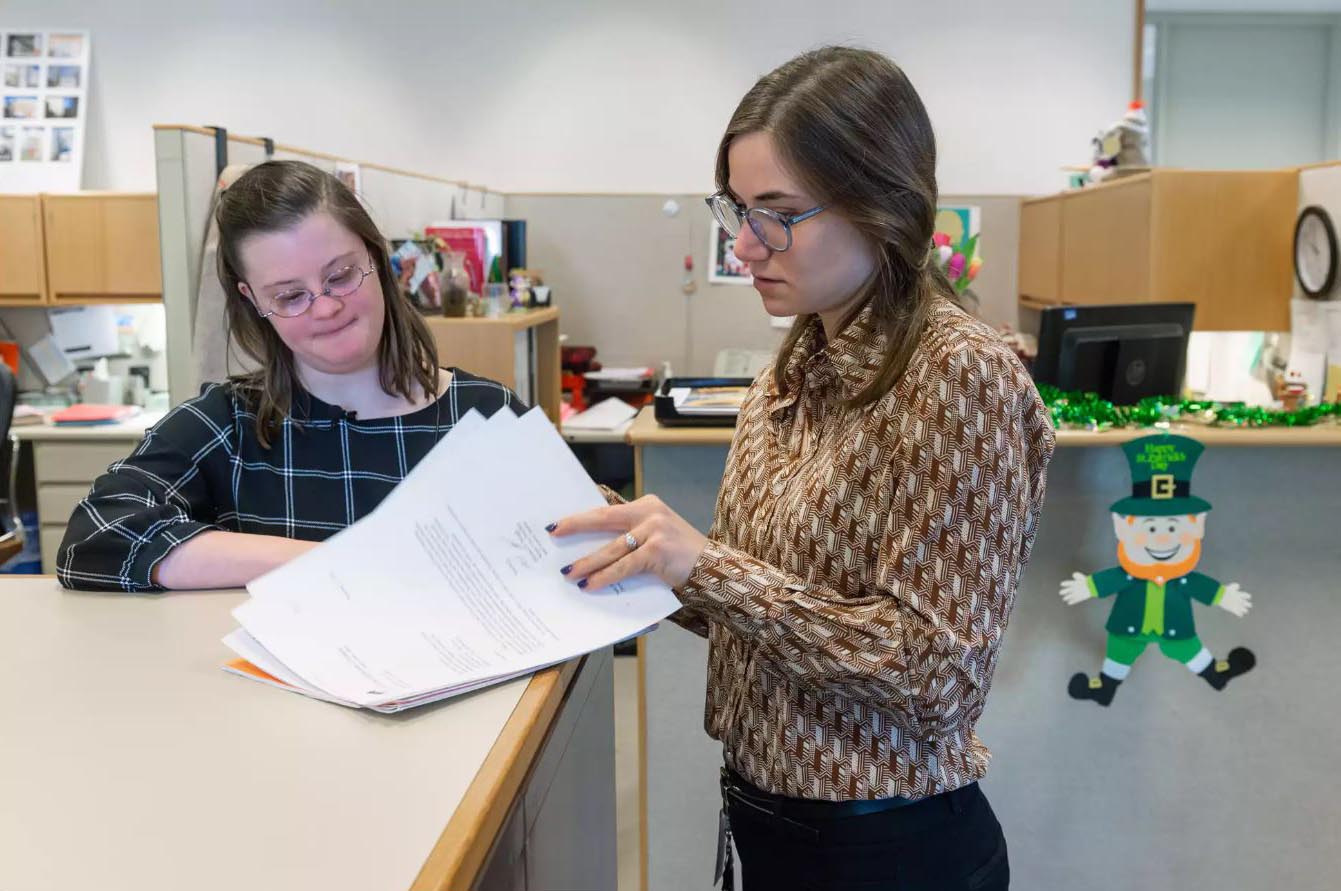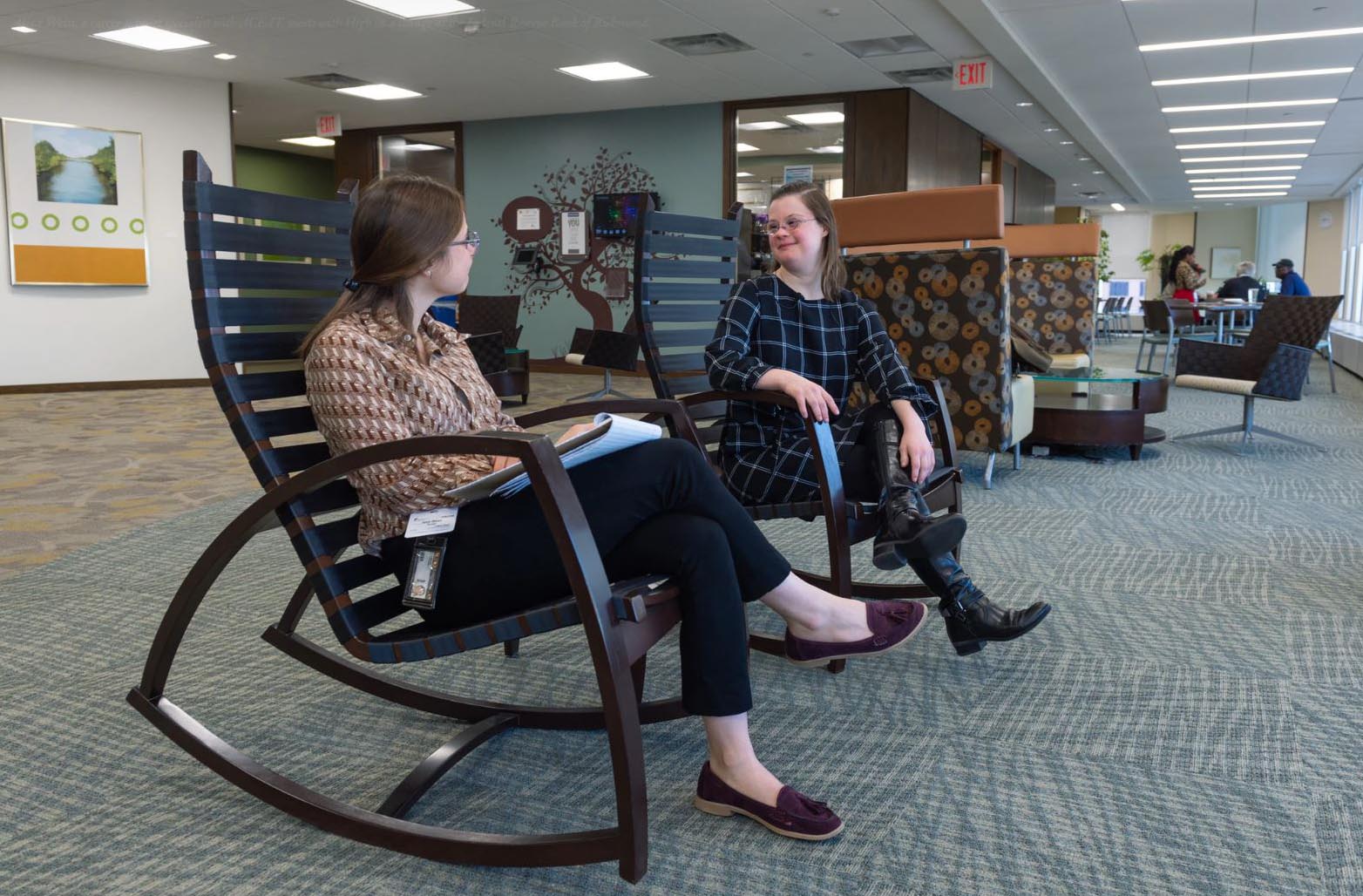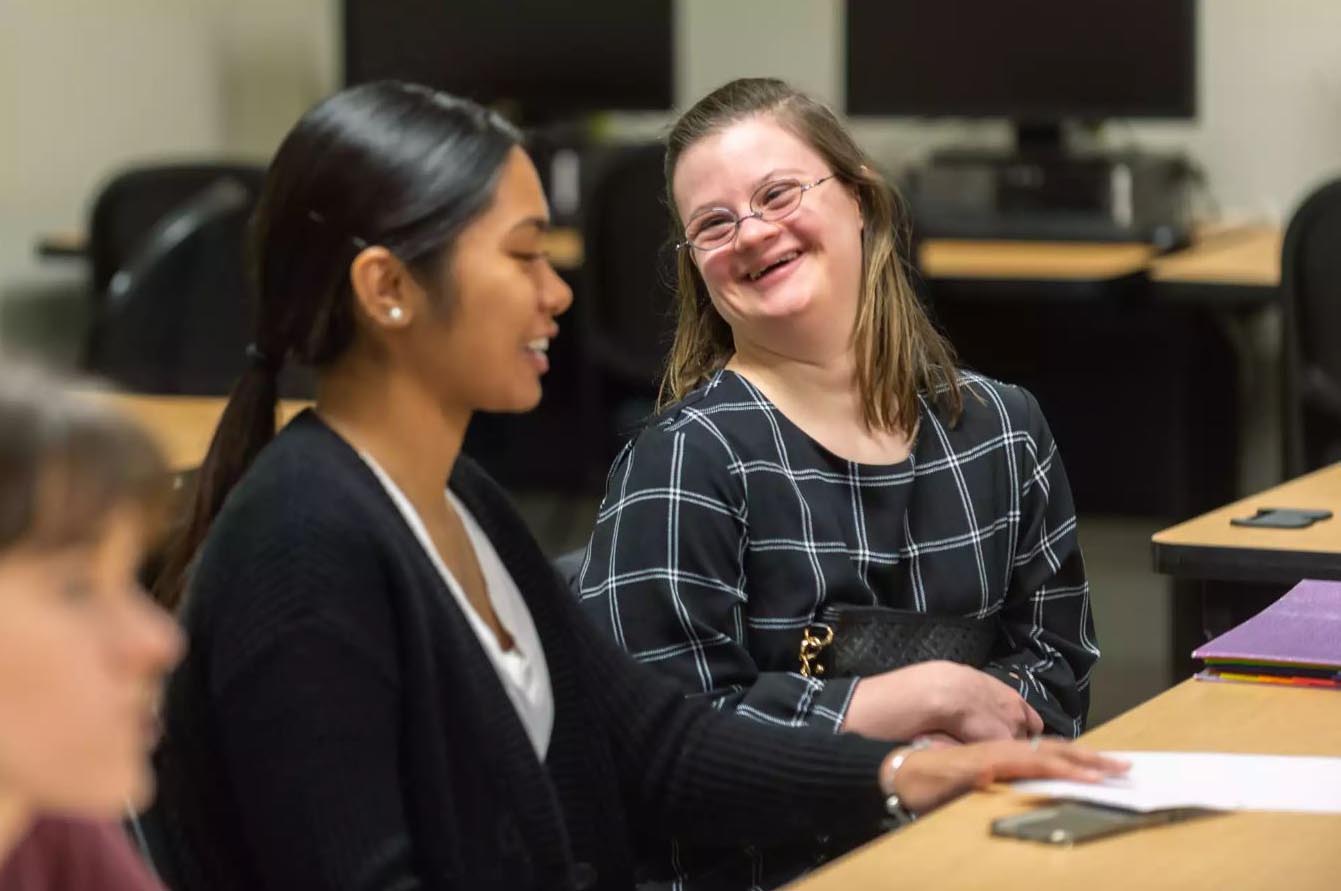Ashley High: A day with an ACE-IT in College student
Internships. Classes. Starbucks breaks. ACE-IT in College is an inclusive college experience for students with intellectual disabilities.

By Brian McNeill, University Public Affairs, 804-827-0889, bwmcneill@vcu.edu
Tuesday, April 2, 2019
On the fifth floor of the Federal Reserve Bank of Richmond, Ashley High is carefully inspecting each document in a filing cabinet, hunting for outdated records.
“If the year is 2012, I have to shred that,” High said. “I like shredding.”
High is interning in the Federal Reserve Bank’s Audit department through a Virginia Commonwealth University program that provides young people with intellectual disabilities an opportunity to attend college classes at VCU and gain real-world work experience.
“Ashley’s currently working on a records retention project,” said Logan Davis, an audit manager and High’s supervisor. “I had one assignment for her that I thought would take eight weeks. It took her two weeks. She works fast and she learns fast. She wants to push herself.”
High overhears Davis as she feeds a pile of papers into a heavy-duty shredder. “I love every project Logan gives me,” she chimes in. “I like to challenge myself.”
Working in an office such as the Richmond Fed is High’s dream job. When she enrolled in the VCU program — called ACE-IT in College — she expressed an interest in working in an office setting, where she could use programs like Excel and help with organizational tasks.
“[At the Fed] she’s able to use her computer skills, which are really strong. Ashley can learn a process on a computer pretty quickly,” said Jaclyn Camden, a business liaison with ACE-IT who works with High. “So a lot of the things that she does in the Audit department are project based. So she’s able to use her interest in using Excel and spreadsheets and helping departments stay organized.

Fed. "I just provide the support to get her there," Weiss said. "She's really great at getting it."
“And I think one of the things that she really enjoys is just supporting an office in any way that they need to be supported,” she added. “She is [a person who] is extremely committed to the mission of a department and committed to helping her coworkers and working as a part of a team.”
A Self-Determined Future
People with intellectual and developmental disabilities are historically unemployed or underemployed despite their ability, desire and willingness to work, according to the American Association on Intellectual and Developmental Disabilities. Less than a third of adults with a cognitive disability and who were not institutionalized were employed in 2017, according to U.S. Census data.
Since ACE-IT launched at VCU in 2011, 90 percent of its alumni have gone on to obtain paid, competitive, inclusive employment. And 86 percent of ACE-IT students and families have reported improved quality of life.
A two-year inclusive learning and training certificate program for 18- to 26-year-olds with intellectual disabilities, ACE-IT is part of the Center on Transition Innovations, a collaborative effort between the VCU School of Education, the Virginia Department of Education and the Virginia Department for Aging and Rehabilitative Services.
The program provides individual support to its students, enabling them to participate in employment, campus life and campus activities.
The idea is that these college and work experiences will prepare students like High to pursue the self-determined futures of their choosing.
“Ashley is a terrific example of how VCU ACE-IT students can fully participate and benefit from being in college,” said Elizabeth Evans Getzel, director of the Center on Transition Innovations. “The program is structured to enable students to fully engage in all aspects of college with a focus on moving toward a career of their choice. This is the case for anyone attending postsecondary education, and the vision of ACE-IT is to expand the diversity and inclusiveness of college for students who would not otherwise have this opportunity.”
She 'Gives 300 Percent'
High interns at the Federal Reserve Bank of Richmond this semester on Mondays, Wednesdays and Fridays. On a recent Wednesday, the day started around 8:30 a.m. when High’s parents dropped her off outside the Fed’s security gates.
“Good morning!” she said, waving to security guards.
“Good morning, Ashley,” one responded. “How’re you doing today?”
“Great!”
After making her way through several layers of security, High arrives in the Audit department and is joined by Aliza Weiss, a career support specialist with ACE-IT. Weiss is on hand throughout the day to provide assistance — she prepared a red binder for High that includes helpful reminders about work processes and projects — but generally hangs back.
“What I typically do is, Logan will give Ashley instructions and I’ll take notes on that, type it up, print it out and then she has a reference,” Weiss said. “So I might teach her a couple times, and then I'll fade away and I'll sit over in the telecommuter’s cube or I’ll go to the fourth floor and just pop in [as needed].”

The goal, Weiss said, is to allow High to be independent.
“I just provide the support to get her there,” Weiss said. “She’s really great at getting it.”
On this particular workday, High met with Davis early to go over the day’s tasks, including the records retention project.
“We’re shredding files today, right?” Davis asks.
“Yes,” High said. “I’m looking forward to it.”
Nearby, Jane Lee O’Connell, a lead IT auditor, said working with High has been a delight.
“She is very conscientious, very humorous. She’s added a lot of humor to our office. She’s a great colleague to have,” she said. “She [recently] completed an assignment for us, and it took a lot of thought and preparation and meeting with manager-level personnel, and she handled herself very professionally.”
Davis said High’s enthusiasm has changed the dynamic in the Audit department.
“The energy she brings, it gives everyone a boost. … They seem more energized. They come to her, wanting to work with her. They’re all rooting for her,” he said. “We’re all a bunch of introverts [in the department]. Ashley’s sociable. So she’s changed the dynamic quite a bit. And I think she has taught our team a lot about effort. Don’t get me wrong — our team works hard. But she comes here every day and gives 300 percent. I have to ask her to take a break sometimes because she just wants to work.
“No task is beneath her,” he added. “The work that others may not find enjoyable, she loves doing it. She takes a lot of pride in doing it right.”
When High started her internship this semester, Weiss gave a presentation about ACE-IT, disability awareness and about High herself to some of her new coworkers.
“Ashley is very social and wants to interact with people,” Weiss said. “So a suggestion I gave was to say hi. And make sure, when you’re saying hi, to not just wave and say hello. But go into her cube and have a conversation. People listened to that and everyone has been very inclusive, making sure Ashley is in on meetings and people really check in with her.”
High’s internship is with the Audit department’s quality assurance team. Davis described her work as ensuring the team is following the processes they’re supposed to follow.
“She’s worked on a variety of projects,” he said. “She's actually found a few discrepancies with some of the work that we do, and she’s helped the team fix it.”
High said she loves her internship, describing it as an “environment where people care about people with disabilities like me.
“I’m proud to intern here,” she said. “Working [here] gives me the experience of working with team members and communicating with them, and lets me live life to the fullest.”
A Hardworking Student
At noon, High’s internship at the Richmond Fed is finished. She catches a ride over to VCU’s campus. She typically grabs lunch in University Student Commons at Subway or Chick-fil-A, and eats it in James Branch Cabell Library while studying ahead of her 2 p.m. class.
The class, English 295: The Reading and Writing of Fiction and Poetry, is taught by Scott Selden, a graduate assistant in the Department of English in the College of Humanities and Sciences.
“I’m happy to have [High] here,” he said. “I don’t know that I necessarily set her apart from any other student. She’s a good student. I’ve enjoyed reading her work. And the other students are glad that she’s here.”
Attending class alongside High is Nadia Pablo, a VCU sophomore in the Department of Kinesiology and Health Sciences in the College of Humanities and Sciences, who serves as High’s academic coach in ACE-IT.
“I absolutely love her,” Pablo said. “She’s so bubbly. And she’s so optimistic all the time. She’s a very hardworking student. She’s always getting her assignments done on time. She always comes to me if she has questions, and she’s always willing to ask her professor and initiate those conversations.”
Earlier in the semester, the class was assigned to write poetry on whatever topic they liked.
“Ashley knew exactly what she wanted to write,” Pablo said. “She wrote one poem about Starbucks. Another one was about a cupcake shop called Pearl’s [Bake Shoppe]. When we went to class to present her poem, the class absolutely loved it.”
High said her favorite part of class has been meeting people. When asked if the class has been challenging, she replied: “It was hard in the beginning but now it’s very easy.”

attends class, English: 295: The Reading and Writing of Fiction and Poetry.
After class, High and Pablo meet for an additional hour in a Cabell Library study room to go over the class’ content. On this particular day, they reviewed, among other topics, how writers could convey character, setting and tension in short stories.
“I always ask her first, ‘What do you feel like you want to work on during study session?’ And then if she says not really anything, then we’ll go over what we went over in class or we would go over the syllabus and make sure we’re hitting all the assignments,” Pablo said. “But mostly we’re doing homework during our coaching session.”
Career Goals
The goal of ACE-IT is not just to get students like High jobs. It’s to put them on a path to a career post-graduation that matches their interests.
“When we’re looking at campus employment or internships, we’re looking [for] experiences that really align with their interests and their career goals that will set them up for competitive employment after they graduate,” said Camden, the ACE-IT business liaison who works with High.
While High is working in an office setting, other students in ACE-IT have been interested in pursuing all sorts of careers.
ACE-IT students interested in education have worked at the Science Museum of Virginia. Several who wanted to work with children did internships at day care facilities. One current student who has a black belt in taekwondo is interning as an assistant instructor at a local dojo, with the goal of one day opening his own. And one former ACE-IT student, Troy Carter, interned at Richmond Region Tourism and went on to land a job there after graduating in 2018.
Just as important as the internships, however, is the students’ experience on VCU’s campus.
“You’re building that knowledge base while developing some of those other skills that are really critical for the workforce,” Camden said. “For [ACE IT students], like any other college student, college is a time where you can mature and you can grow and you can experience things that you don’t typically get to experience just going into the workforce or just in high school.”
“So I think that the collaboration between employment experiences and college — like going to classes, going to the gym and everything else — that combination is really what sets students up for success after graduation.”
Lots of New Skills
At the end of her study session with Pablo on this particular Wednesday, High gathers her things and heads outside to wait for a ride from her parents. She’s finished her homework for next week’s poetry class, but depending on the day, her evenings sometimes include more studying at home or attending theater lessons at SPARC, a local performing arts center.
Like any college student, High has a full plate, but she wouldn’t have it any other way.
Would she recommend ACE-IT to other young people with intellectual disabilities?
“I would tell them,” she said, “with ACE-IT in College, you gain lots of new skills through college, gain learning experiences and get competitive jobs.”